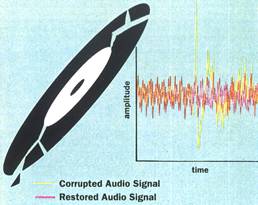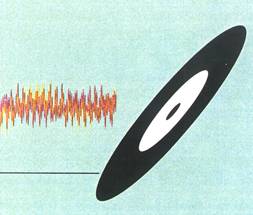| enginuity |
|
Sound Vision
Have you ever tried listening to one of your old LPs and wished you 'd never spilt that cup of coffee on it? Well, about five years ago, the Signal Processing group at the Engineering Department was approached by the National Sound Archive to see if old recordings could be improved by signal processing techniques. The work of a PhD student, sponsored by the British Library, was sufficiently encouraging to result in the development of a system which became operational two years later. A 'bureau service' for improving old recordings was soon replaced by a commercial system, made and distributed by the company which was set up for the purpose. This system, for computer enhancing digital audio recordings, is now in use in many major recording studios in the world.
The main sponsors, The Cable and Wireless Co and the British library, are now interested in seeing if the team can do the same thing for old movies. The research has already resulted in a technique whereby 'dirt and sparkle' noise can be removed together with general broadband noise. Algorithms to improve film quality have been devised, but processing currently takes 7,000 times real time. Major investment is required to put together commercial equipment capable of faster processing.


Corrupted (left) and restored audio signals.
'As far as video sequence processing goes, I think it is fair to say we are ahead of the field at the moment,' says Dr Peter Rayner who heads the team in Signal Processing. 'The broad philosophy of our work is to concentrate on the development of fundamental principles, although such areas of research are often identified from particular applications.' Other research topics include document enhancement, fire detection and medical applications but details of those will have to wait for another issue of enginuity.
For further information please contact Dr Peter Rayner on (01223) 332646.
| number 2, spring '94 |